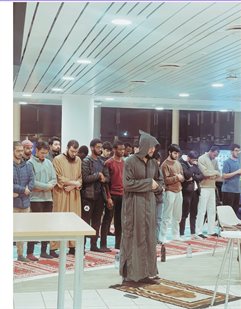Blog: Embracing Ramadan on campus
Written by Salimah Hossain
Assalamu alaikum (may peace be on you)!
I’m Salimah, a second-year Medicine student at UoB and a member of UoB’s Islamic Society.
As Ramadan begins, Muslims across the world are looking forward to reconnecting more with Allah (God) and Islam. Curious to know more about the blessed month? I’m here to shed some light.
Ramadan is the ninth month of the Islamic calendar, and this year will fall between the 10 March – 9 April. It encompasses many things, but here are some of the main ideas.
Fasting
In Ramadan, Muslims fast from dawn till sunset. We have two meals – ‘sehri’ (or ‘suhoor’), which we eat before the sun rises, and ‘iftar’, the meal we eat to break our fast after sunset. Between these two times, we don’t eat or drink anything (yes, not even water!)
As to why we fast, it is stated in the Qur’an (the holy book in Islam): ‘Fasting is prescribed for you – as it was for those before you – so perhaps you will become mindful of Allah’. (2:183). Fasting (known as ‘sawm’ in Arabic) is also a pillar in Islam.
Although initially some might find the prospect daunting, Muslims look forward to fasting! By going without food or water for long periods of the day, we can appreciate all the blessings we have, and try to be grateful for basic necessities that many unfortunately lack. We also aren’t distracted by food during this time which is a change as many often revolve their day around food (that’s not to say I don’t enjoy a Pepe’s outside of Ramadan though!).
Fasting can be intense. However, as stated in the Qur’an, Allah does ‘not burden a soul more that they can bear’ and some groups are exempt from fasting (such as if you are on your period, or sick, or have a valid reason as to why you have to eat/drink).
Prayer and the Holy Book
Ramadan is a month focussed on both spiritual change and physical. Alongside fasting, we try and increase our acts of worship and good deeds. We perform ‘taraweeh’ (a type of prayer) after we have broken our fast, which is done in congregation and used to spend more time in prayer. Ramadan is also extremely important since it is the month the Qur’an was revealed to the final messenger, Prophet Muhammed (peace be upon him), and so Muslims immerse themselves in reading and pondering on this important text.

Habits and routine
Ramadan is a time to develop oneself, in every aspect of their life. It’s the perfect time to make goals and create new habits that last long past the month has ended. For example, I want to develop my relationship with the Qur’an and read more! I also want to focus on spending more time with my family and be mindful of the things I say and do. The opportunity arises to work on yourself due to the change of routine, so if you’re waiting for a chance to grow, it’s now.
How to get involved on campus
One of my favourite things about Ramadan is the unity and community. Muslims across campus come together for the sake of Allah and fast, pray and support each other. At UoB, the Islamic Society hosts free iftars every night where everyone is welcome to come and break their fast together. Some of my best memories include handing out dates with my friends before iftar and praying together late at night. The iftars are open to everyone, so if you fancy chatting with us or seeing what it’s like, feel free to pop in!
The Islamic Society also hosts the one of the biggest events on campus – the annual Community Iftar! On Friday 15 March, between 15:00-21:00, join us in the Great Hall and Chancellor’s Court for an exhibition, speakers, and eventually a meal with many members of the community coming together to break our fast and enjoy the blessed, peaceful atmosphere. You are warmly invited to join us for a Ramadan night under campus lights – regardless of whether you observe Ramadan or not.
